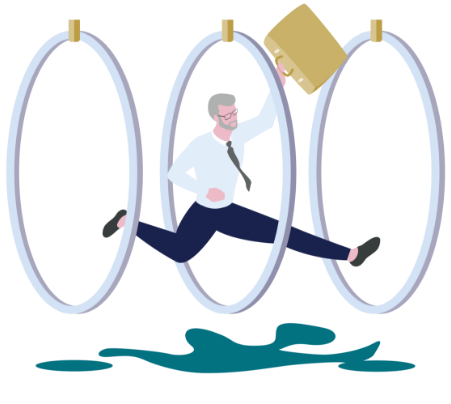What business licences do I need?

From deciding on how your business will operate and choosing the business insurance, to bagging a premises and securing funding, there’s plenty of legal hoops you need to jump through when setting up a business.
One such hoop you need to jump through before opening up shop is having the correct business licences in place. Business licences help ensure you’re running your company in line with the law and tend to be specific to the industry your business is operating in.
But are you baffled by what business licences you might need? Take a read of AXA’s guide business licences to get a better understanding of the types of licences out there and to make sure you’ve got the right ones in place so that your business can hit the ground running.
-
Q What is a business licence?
-
A business licence is a permit issued by the government or a professional body that instructs how specific business activities should be carried out. They're designed to keep business owners, customers and clients safe.
The licences you need for your business depends entirely on where in the country it's based and the industry you operate in – not to mention the business activities you intend to carry out.
Not only do business licences ensure business adhere to a legal framework, they keep businesses accountable for their actions.
-
Q Why might I need a business licence?
-
A wide range of business activities – from processing customer information to seemingly inconsequential things like playing music or having the TV on in your premises – all require business licences.
The main purpose of business licences is:
- To ensure the health and safety of the public and your staff
- To keep your business accountable for its actions
- To encourage best practice
- To help you keep track of your business's finances for tax purposes
- To ensure the health and safety of the public
If the activities you want to carry out require business licences, you need to ensure you have them in place before your business begins operation, otherwise you're breaking the law.
Keep in mind that not every business needs a licence to operate. Some businesses, such as freelance writers and web designers, can operate as long as they've set up with HMRC correctly and have chosen the right legal structure to operate under.
-
Q What businesses need business licences?
-
From restaurants and hairdressers to accountants, lawyers and window cleaners, the majority of businesses require business licences in some shape or form.
For example, if you plan to sell alcohol, you'll need to get the proper business licence in place. To apply for an alcohol licence or just to get detailed information, head to the government's guide to alcohol licensing in your area.
If you're opening a nursery or childminding service, you'll need to apply for specific licences from:
- Care Inspectorate in Scotland
- Care and Social Services Inspectorate in Wales
- Ofsted in England
- Department of Health, Social Services and Public Safety in Northern Ireland
Similarly, if you're an accountant, you'll need to apply for a licence from the Financial Conduct Authority before you can start giving financial advice and support.
These are just some basic examples. If you're struggling to find out what kind of licence your small business needs, head to the government's licence finder tool to find out those that suit your business's activities.
-
Q How do I get a business licence?
-
Business licences are usually granted by individual local authorities. However, if you're setting up a business that provides childcare or financial support, you'll need to get licences from professional trade associations connected to your industry (as outlined above).
Before setting up business, get in touch with your local authority to check if there are any area or industry specific licences or zoning restrictions that could impact or curb its activities.
-
Q How much does a business licence cost?
-
The cost of a business licence depends entirely on the type of licence you need. Business licence fees are usually set by individual local authorities, meaning costs for your business can vary depending on where you're based.
For example, a premises licence – which is needed if you want to sell alcohol in England and Wales – has an application fee, which is based on the rateable value of the premises you need the licence for.
To find out more about the cost of business licences in your area, visit your local authority's website.
Business licence examples
Selling alcohol is one of the most common business activities that you need to have a licence for. But what about the businesses that carry out more niche activities, such as beauty salons or window cleaners?
Here, we place the spotlight on five different types of businesses – retail, professional, trade, services and food-based businesses – to give you an idea of some of the most common types of business licences that UK-based companies must have in place before opening their doors to the public.*
That way, when it comes to your own business, you'll have a better understanding of business licenses and whether or not you've got the right ones in place. Just keep in mind that your business's licencing needs will vary depending on the activities you intend on carrying out.

RETAIL INDUSTRY
Beauty salon
Beautify your customers to earn a penny? Click below to avoid ugly surprises.
See licence types
PROFESSIONAL INDUSTRY
Accountant
You're an expert in balancing books. Check your business licences add up.
See licence types
SERVICES INDUSTRY
Window cleaner
Leaving windows gleaming is your game. Stay crystal clear on business licences.
See licence types
TRADES INDUSTRY
Trades Person
Avoid a spanner in the works by checking the business licences in your toolbox.
See licence types
FOOD & BEVERAGE INDUSTRY
Café owner
You’re boss of the barista. Ensure you’ve got the right business licences on the menu.
See licence typesDon't see your business?
Don't fret. To double check you've got the correct business licences in place to keep your business operating legally and safely, pay a visit to the Government's licence finder for added peace of mind.

RETAIL BUSINESSES
Beauty salon
Opening a beauty salon to help your customers look and feel their best? Before you begin primping and preening, make sure you:
- Get a licence from your local council which permits you to practice
- Obtain a licence with the environmental health section of your local authority
- Register with the Care Quality Commission (England) Health Care Inspectorate (Wales) or Healthcare Improvement Scotland ff you provide services such as laser treatment,
- Ensure you've got your local authority's permission if changing the use of the business premises you're moving into
Once you have these in place, you can start thinking more about the services your beauty salon is going to offer and the assets to have in place to help with the everyday running of your business.
As a business salon, it's likely that you'll be carrying out some of the following activities:
- Using CCTV systems
- Offering special treatments such as massage, reflexology and homeopathy, at your premises
- Processing personal information about any individuals including customers, employees etc
- Putting an advertising board on the pavement or verge
- Playing background music in your premises
- Processing, store or dispose of dangerous or harmful substances
- Selling beauty products
To give you a helping hand, we've listed some common business licences that a retail beauty salon should consider getting in place before trading.

Licence to play background music
Planning on playing some music to add a bit of atmosphere to your beauty salon? Whether it's the top 40 on the radio or a playlist of tunes to help your clients chill out, if you plan on playing music in your premises, you need to apply for the PPL PRS Ltd.'s TheMusicLicence.
This allows you to legally play music for employees or customers in your business, whether this is through the radio, TV or other digital devices.

TV Licence
If you want to treat your customers to a bit of telly while they wait on being pampered, you must have a TV Licence in place.
A standard TV Licence costs £154.50 and you need to have one in place if anyone on your business premises watches or records programmes on a TV, computer or other device as they're being broadcast. This includes downloading or watching programmes on apps like BBC iPlayer.
Find out more about TV Licences for businesses here.

Notification to process personal data
If your business processes customers' personal data – such as employment details and addresses – that can be used to identify an individual, then you need to pay a data protection fee to the Information Commissioner's Office (ICO).
Application fees range between £40 and £2900. Find out more about data protection fees here and learn how to keep your business GDPR compliant with our guide.

Public space surveillance (CCTV) licence
You need to get this licence from the Security Industry Authority (SIA) if you plan to use CCTV equipment to record the activities of members of the public in your business premises. The licence application fee is £210 for a three-year licence.
To get your licence you must be 18 or over and pass an identity and criminal record check. Head here to apply for your public space surveillance (CCTV) licence.

Pavement or street display licence
You'll need to get this written permission if you plan on putting signs or displays on the road or pavement advertising your business's services. Keep in mind that these licences differ between England and Wales and Scotland.

Premises licence
This is a permanent licence given to a premise that lets the holder carry out licensable activities, including serving alcohol. If you plan on serving your clients a complimentary glass of fizz while pampering them, then you'll need to apply for a premises licence before you're legally allowed to serve it.
Keep in mind that Scotland's premises licence differs from the premises licence available in England and Wales. Always get in touch with your local authority for information surrounding licencing laws.

Personal licence to sell alcohol
It's also crucial that you or a staff member hold a personal licence if you plan to sell or serve alcohol from your licenced business premises.
To obtain this licence you must be 18 or older and hold a licensing qualification, such as the Award for Personal Licence Holders (APLH) Level 2. You can apply online for a licence in England and Wales but you need to contact your local council if you're looking for a personal licence in Scotland.
Be aware that if you've already got a Temporary Events Notice to carry out licenced activities on unlicensed premises (such as holding a prosecco night for some of your most loyal clients) then you don't need to apply for a personal licence to sell alcohol.
Protect your business with beauty salon insurance from AXA

PROFESSIONAL BUSINESSES
Accountant
From keeping books balanced to ensuring your clients pay the right amount of tax, it's your job to ensure that your customers' finances add up as they should. As an accountant, it's likely that you'll carry out the following business activities:
- Managing clients' spending and costs
- Filing tax returns and give tax advice
- Processing personal information about customers or clients
- Providing debt adjustment or debt counselling services
- Forecasting profits and performance
- Undertaking regulated audits and other financial services
Here's some common licences you should have in place for your accountancy business before you begin tallying up the numbers.

Financial Conduct Authority (FCA) authorisation
Before your business can carry out regulated financial activities, such as offering financial advice or providing debt management support, you need to have authorisation from the Financial Conduct Authority.
Carrying out regulated activities without being authorised could result in fine or imprisonment, so it's important that you have everything in place from the get-go. Read the FCA's guide on how to apply for this authorisation.

Notification to process personal data
If your business processes customers' personal data – such as employment details and addresses – that can be used to identify an individual, then you'll need to let the Information Commissioner's Office (ICO) know.
Data protection application fees range between £40 and £2900. Find out more about data protection fees here and learn how to keep your business GDPR compliant with our guide.

Money laundering registration
As your accountancy business is based in the financial sector, you'll need to register it with an anti-money laundering scheme. You need to register with the professional body that regulates your industry sector, otherwise you're breaking the law if you choose to operate without one. For details on how to register, head here.

Become a registered auditor
Your business needs to be a registered auditor if your accountancy business performs audits on company accounts.
In order to apply, you or one of your staff must be a qualified auditor and your business must have professional indemnity insurance in place. You can then register with the relevant accountancy body you or your staff trained with. It's illegal to practice auditing if you're not a register auditor and doing so could result in prosecution and fines from your accountancy body. Head here for more information.

Authorisation to act as an insolvency practitioner (England, Scotland & Wales)
If your business offers services to help insolvent clients – those who are unable to pay the money owed to a person or company on time – then it must have a licenced and authorised insolvency practitioner. Read the Government's guide to how insolvency practitioners are authorised.

Public space surveillance (CCTV) licence
You need to get this licence from the Security Industry Authority (SIA) if you plan to use CCTV equipment to record the activities of members of the public in your business premises. The licence application fee is £210 for a three-year licence.
Protect your accountancy business with professional services insurance from AXA

TRADE-BASED BUSINESSES
Trades
Regardless if you're a joiner, electrician, plasterer or painter and decorator, you all have one thing in common: to provide the best service to your customers.
Whether this mean fixing faulty electrics or giving life to home improvements your customers have dreamed of for years, you work hard to get a job done well and build your business's reputation.
As a tradesman, you could carry out the following activities:
- Electrical installation and repair
- Floor covering
- Joinery
- Painting and decorating
- Plastering
- Roofing
- Glazing
- Placing builders skips on a public road
- Erecting scaffolding or hoardings
- Carrying out construction or building work
- Operating a goods vehicle
Here's some business licences you should consider getting in place before you start carrying out any of the activities listed above.

Scaffolding and hoarding licence (all UK)
This licence is required if you're looking to carry out any building work, maintenance, or removing part of a property next to a public road or pavement. Applications to place scaffolding should be made at least 15 days before work is due to start. Read the Government's guide to applying for this licence here.

Street works licence (England, Scotland and Wales)
You need to get this licence from your local council if you plan on placing street works machinery on a public road in England, Wales and Scotland. Failure to have this licence in place when carrying out work could result in fines of up to £5000. Find out more here.

Goods vehicle operator licence (England, Scotland & Wales)
This licence is needed if your business uses goods vehicles above a certain weight. There are three different types of licences available and what one you need depends on the work you do.
You must ensure that all drivers have the necessary licences and training and that all vehicles are correctly taxed and kept in good condition at all times. Find more information here.

Skip licence (England and Wales)
This licence allows you to place a skip on a specific public road or footpath. Bear in mind that a separate licence exists for this in Scotland.

Register to carry out gas work
You must get your business on the Gas Safe Register in order to legally work on gas fittings or gas storage vessels in the UK.

Notification to process personal data
If you process customers' personal data – information, such as employment details and addresses, that can be used to identify an individual – then you need to pay a data protection fee to the Information Commissioner's Office (ICO).
The cost of data protection fees ranges between £40 and £2900. Find out more about data protection fees here and learn how to keep your business GDPR compliant with our guide.
Protect what you’ve built with insurance for tradespeople from AXA

SERVICE-BASED BUSINESSES
Window cleaner
As a window cleaner, it's your responsibility to keep your customers' windows sparkling, come rain, shine or whatever else the Great British weather throws at us.
As such, it's likely that you'll carry out the following activities while you work on getting others' windows gleaming:
- Processing personal information about customers
- Discharging trade effluent
- Distributing free printed material
- Transporting, storing, processing, recycling, exporting or disposing of waste material
To keep things crystal clear, we've rounded up the business licences you should get in place before carrying out any of the activities listed above.

Window cleaner's licence (Scotland)
Most Scottish councils require window cleaners to have this licence as well as public liability insurance and employers liability insurance (if applicable) before they can operate. Council-issued licences usually last for three years. In England and Wales, you'll need to register as a waste carrier, broker or dealer.
If you work without a licence, you may be fined up to £2500. Find out more here.

Waste management licences
You need a licence from the Scottish Environment Protection Agency (SEPA) to treat, keep, or dispose of waste in Scotland. In England and Wales you need to register or renew as a waste carrier, broker or dealer – even if your produces a minimal amount of waste through its day-to-day activities.

Environmental permits
Depending on where your business is based, you may need to apply for an environmental permit from your local authority in order to dispose of waste safely.
Always check with your local council before operating. Visit the Environment Agency and the Scottish Environment Protection Agency for more information.

Permission to distribute leaflets (England and Wales)
Looking to drum up a bit of attention for your business by sending out leaflets to prospective customers? You'll need to get this licence in place to get consent to distribute free printed material in areas controlled by the local council. Find out more here.
Don't let the unexpected shatter your plans. Protect your hard work with AXA business insurance

FOOD-BASED BUSINESSES
Cafés
Whether it's a high street hotspot or a hidden gem, you've worked hard to make your café an ideal place for customers to catch up over a cuppa, tuck in to some tasty treats or while away a few hours with a newspaper.
As an expert in all things café culture, it's likely that you'll carry out the following business activities:
- Prepare, store and sell foodstuffs
- Play background music in your premises
- Use advertising boards on the pavement outside your premises
- Use a television or other device to receive or record broadcast programmes
- Employ young people aged 13-16
- Put tables or chairs on the pavement
- Sell alcoholic drinks
To help you get your best foot forward, we've listed some common business licences you should have in place for your cafés before carrying out any of the activities listed above.

Food business registration
If your business cooks, stores, handles, distributes, supplies or sells food, then you need to register for this licence with your local authority.
It's free to register and you need to do so at least 28 days before your business opens its doors. If you run your business without getting it registered, you can be fined and face up to two years in prison. Apply for this licence here.

Food premises approval
If you prepare food in your premises, it'll need to be inspected and approved by your local council before you can begin cooking and brewing up a storm. Once obtained, you'll need to display your approved status according to your council's rules.
Food premises approval rules are different in England, Wales and Scotland, so make sure you read up before applying. Running a business without this licence could result in you being prosecuted, so don't risk it.

Permission to place tables and chairs on the pavement
Keen to offer your customers the option to dine alfresco? You'll need to apply for a licence from your local council if you want to place tables, chairs or other furniture on the pavement temporarily.
You permit will likely include restrictions on size and you'll need to meet other conditions, including leaving a certain width of pavement free for pedestrian traffic. You'll also need to supply a site plan and your business's public liability insurance certificate to support your application.
Apply here if your business is based in England and Wales and here if it's Scotland-based.

Public space surveillance (CCTV) licence
If you want to use CCTV cameras to beef up your café's security, you'll need to get this licence from the Security Industry Authority (SIA) to monitor and record customers in your premises.
It costs £210 for a three-year licence and you must be 18 or over before you can apply. You'll also need to pass an identity and criminal record check too. Head here to apply for your public space surveillance (CCTV) licence.

Pavement or street display licence
Planning on using signs or displays to advertise this week's specials and entice passers-by into your café? Make sure that you've got this licence in place before putting any form of signs or displays advertising your business outside your premises. Keep in mind that these licences differ between England and Wales and Scotland.

Premises licence
If beer and wine are on your café's menu, you'll need to get a premises licence in place so that your business is legally allowed to serve alcohol.
Be aware that Scotland's premises licence differs from the premises licence available in England and Wales. Always get in touch with your local authority for information surrounding licencing laws before you apply.

Personal licence to sell alcohol
As well as having a premises licence, you or a staff member need to hold a personal licence if you plan or selling alcohol from your café.
You must be 18 or older and hold a licensing qualification, such as the Award for Personal Licence Holders (APLH) Level 2, to get this licence. In England and Wales you can apply online for a licence, but you need to contact your local council if you're business is based in Scotland.
If you already have a Temporary Events Notice in place to carry out licenced activities on unlicensed premises (such as holding a wine-tasting night) then you don't need to apply for a personal licence to sell alcohol.

Licence to play background music
Whether you want to listen to the radio while you work or you've curated the perfect Spotify playlist to set the scene, you need to apply for PPL PRS Ltd.'s TheMusicLicence if you plan on playing music in your business.
This licence lets you legally play music for your employees and customers, whether you do it through the radio, the TV or other digital services.

TV Licence
If you want to treat your customers to some telly while they have a brew, you need to have a TV licence for your business.
A standard TV Licence costs £154.50 and you need to have it in place if anyone watches or records programmes on a TV, computer or other device as they're being broadcast while in your premises.
Find out more about TV Licences for businesses here.

Child work permit
If you want to employ children between the age of 13 and school leaving age to lend a helping hand, you need to apply for this licence.
You'll need to apply for a permit from your local council and provide details about your business, the potential employee, the job they're being employed to do and the hours they're expected to work.
You'll also need to provide a statement by the child's parents stating that they agree to the employment and a risk assessment.
Find out more about child work permits in England and Wales here and Scotland here.
Protect your hard work with AXA's business insurance for cafés and coffee shops
There's no business quite like yours. To ensure that you've got the licences in place that you need to run your business legally and safely, always visit the Government's licence finder before operating.
What happens if I break the rules of a business licence?
To keep your business licences, you need to make sure that you don't break any of the rules that they set out.
If you do breach any of the conditions of your business licences, accidentally or otherwise, you could be fined and have your licence revoked, leaving you without the legal cover to carry out your business activities legally. Not only this, you may not be able to apply for the relevant business licences again, which could put your business in jeopardy.
To keep your business legal, compliant and protected, the best thing to do is to adhere to the rules stipulated by business licences as closely as you can.
And if you're ever unsure about a business activity you want to carry out, get in touch with your local authority for advice before doing anything else.
Business licences are designed to keep you and your customers safe and legal when carrying out your day-to-day business activities. Don't delay. The sooner you get them in place, the sooner you can open your doors and start flexing your licence to thrill your customers.
And if you're unsure what licences are the right fit for your business, just get in touch with your local council for a nudge in the right direction.
Running a small business isn’t easy. Protecting it is.
Running a business is hard work. That’s why we’re doing all we can to make your insurance a bit simpler. From working to pay claims quicker to cutting down on business insurance jargon, find out what we’re doing to help.
Learn about AXA Business Insurance*The licences suggested are recommendations only. Always consult your local council and the Government's licence finder tool to ensure you have the right business licences in place before you begin operating your business.